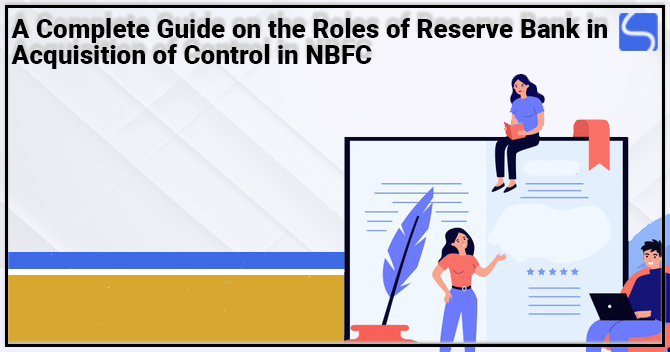A Complete Guide on the Roles of Reserve Bank in Acquisition of Control in NBFC

Karan Singh | Updated: Apr 06, 2021 | Category: NBFC
NBFC or Non-Banking Financial Company is mostly a money loaning or advancing or lending company that operates as per the provisions of the Reserve Bank of India (RBI). Such financial companies are registered under the Companies Act, 2013. The main business area of Non-Banking Financial Companies is credit lending. Moreover, they also involved in the business of leasing, shares, securities, and hire purchase. But, there are some exceptions for Non-Banking Financial Companies as far as their business opportunity is concerned. They are not allowed to serve business areas such as industry, trading of goods, construction, or agriculture. Non-Banking Financial Companies also emphases on the business of accepting deposits. Scroll down to check more information regarding the roles of the Reserve Bank in the Transfer or Acquisition of control in NBFC.
Table of Contents
First Step towards NBFC Registration
Establishing a company is the foremost step toward NBFC Registration. Some of the following documents are required for establishing a company:
- AOA (Articles of Association);
- MOA (Memorandum of Association);
- Address & identity proof of the company’s director.
Article of Association
The AOA (Articles of Association) enclose the guidelines that control and regulate the company. Furthermore, it also comprises the ownership percentage and structure of ownership. Any alter in the ownership of Non-Banking Financial Companies searches for permission of ROC (Registrar of Companies). It simply means that if the company’s member seeks for the transfer of control in the company, then the intervention of the Registrar of Companies is mandatory for the process completion.
However, before approaching for approval from ROC, the members of the company should organize a normal meeting to take a common decision on such matter. In the same condition, Non-Banking Financial Companies need to obtain permission in the event of a transfer of control within the company.
The Reserve Bank of India is the regulatory authority of the Non-Banking Financial Companies. The RBI[1], on consistent intervals, rolled out various circulars regarding the activities of Non-Banking Financial Companies in India. One such notice is the consent required from the Reserve Bank for Transfer or Acquisition of control in NBFC.
Notification Released in 2014 by RBI for Transfer or Acquisition of Control in NBFC
In the past years, the Reserve Bank of India has released a notification “CC.No.376/03.10.001/2013-14” regarding the transfer or acquisition of control in NBFC. As per this notification, the members of the company are searching for the modification in the control of the company are needed to avail prior permission from RBI.
The RBI Act Section 45 IA (4)(c) defines that the certificate of NBFC Registration cannot be granted to the company if the atmosphere of the new promoter obstructs the interest of the public status or the depositors in any sense. Before this notification, the RBI announced a circular in 2009 that addressed the same interest. However, it only managed the deposit-taking Non-Banking Financial Companies operating across the nation.
As per this notification, in 2013-14, the Reserve Bank of India released another statement that hassled the same area of interest. As per the notification, the prior consent of the Reserve Bank of India shall be needed in case of:
- Acquisition of shares of Non-Banking Financial Company in the takeover event;
- Amalgamation or merger with another company allocation the same business;
- Any Amalgamation or Merger that outcomes in the acquisition of shares over 10% of the paid-up capital;
- Addressing the hearing u/s 391-394 of the Companies Act, 1956 or under Section 230-233 of Companies Act, 2013 to benefit order for the merger.
The additional circular gave the reference of previous notification that leads the Non-Banking Financial Company to obey the rules and regulations under Section 45K. Any transfer of shares in the breaking of the respective sections will attract strict penalties.
Circular of RBI on 2015-16 for Transfer or Acquisition of Control in NBFC
The RBI carried out an update concerning the transfer and acquisition of control in NBFC in 2015. The circular search to replace the earlier notification that was publicized in 2014. The Reserve Bank of India inspected the prior guidelines on transfer/acquisition of control in NBFC released in the year 2014.
During the assessment, the Reserve Bank of India arranged the process of transfer or acquisition of control in NBFC in the ambit of the notification released in Mar 2015. While some recommendations were similar to the previous notification, the Reserve Bank had made several alterations. The given list exhibits the series of advice made by the Reserve Bank of India:
- The RBI highlighted the necessity of writ approval from the Non-Banking Financial Companies in case of transfer or acquisition of control in NBFC;
- Writ approval is required for any modification, acquisition or transfer of control in NBFCs. The permission of the Reserve Bank of India is compulsory regardless of whether there is an alteration or not in the Non-Banking Financial Company’s management.
- Any alter in the company’s control should reflect in the shareholding pattern as well. If the way of shareholding changes over time, then writ permission is required from the Reserve Bank.
- Writ permission from RBI is crucial in case if the shareholding pattern altered more than 26%. Such a rule would liquefy in the event of alter of shareholding happens due to buyback of share or in the case where there is a legitimate capital reduction procedure.
- Directors can’t be replaced without the approval of the Reserve Bank. If an important modification occurred in the management by replacing more than 30% of members (excluding independent director), then the Reserve Bank of India’s approval becomes compulsory in such an event. But, the Reserve Bank of India doesn’t interfere in the matter of re-election or retirement of the directors.
Modification on the Management
Apart from the above guidelines, the Non-Banking Financial Company has to regularly intimate the RBI to modify the management and members in the company. This would also be mandatory under the NBFCs approval of Public Deposits Direction, 1998.
The regulations such as Non-Systemically Important NBFCs (Non-Deposit Accepting Holding) Prudential Norms (RBI) Directions, 2015 and Systemically Important NBFCs (Deposit Accepting or Holding) Prudential Norms RBI Directions, 2015 directs Non-Banking Financial Companies to disclose the ownership change.
What is the Procedure for Previous Approval from the RBI concerning Transfer or Acquisition of Control in NBFC?
- The Non-Banking Financial Company must make a writ application on the company’s letterhead for availing permission from the Reserve Bank of India (RBI) for NBFC Takeover. At the time of applying, the Non-Banking Financial Company should add the above-mentioned alters of control in the Non-Banking Financial Company;
- The specified documentations have to provide by the applicant along with an application;
- Detailed information about the proposed members or directors. This will encircle information related to key management administrators serving the company.
- Information concerning the funds’ source in the NBFCs;
- A written declaration is prepared by the members about their non-connection with the companies that accept the public deposit;
- A declaration is prepared by the members and directors of the company about their non-connection with any type of companies;
- A declaration from directors show that they have no pending cases u/s section 138 of the reachable instruments act;
- A banker’s report;
- The application should be submitted to the regional office of the Reserve Bank of India, where the Non-Banking Financial Company is carrying out its operation.
Conclusion
The Non-Banking Financial Company should obey all the compliance and bylaws concerning the status of shareholding and alter in the directors, members, top management in specific. After getting the consent of the Reserve Bank of India, the Non-Banking Financial Company is liable for sharing the matter through notification with the public. Supervising such a requirement would land the NBFC in the legal penalties area that also comprises the overturning of the Registration Certificate.
Read our article:A Complete Guide on Maintenance of Liquidity Coverage Ratio under NBFC















